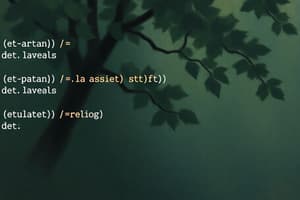Podcast
Questions and Answers
What does the putchar function in C do?
What does the putchar function in C do?
- Writes output to the screen (correct)
- Displays a string on the screen
- Reads a string from the keyboard
- Reads a single character from the keyboard
Which function is used to read a single string from the keyboard in C?
Which function is used to read a single string from the keyboard in C?
- getchar
- puts
- printf
- gets (correct)
What is the purpose of the scanf function in C?
What is the purpose of the scanf function in C?
- Display output to the screen
- Displays a string on the screen
- Reads input from the standard input stream according to the format provided (correct)
- Reads a single character from the keyboard
Which format specifier would you use for reading a character in C?
Which format specifier would you use for reading a character in C?
What does the sprintf function in C stand for?
What does the sprintf function in C stand for?
How is printf() different from puts() in C?
How is printf() different from puts() in C?
Which function is used to display a value like float, integer, character, or string on the console screen in C?
Which function is used to display a value like float, integer, character, or string on the console screen in C?
'&' operator is used in which function for storing variable values at memory locations?
'&' operator is used in which function for storing variable values at memory locations?
'gets' and 'puts' functions are primarily used for what in C?
'gets' and 'puts' functions are primarily used for what in C?
What type of value does %f represent as a format specifier in C?
What type of value does %f represent as a format specifier in C?
Flashcards are hidden until you start studying
Study Notes
Operators in C
- Operators are symbols used to perform operations
- There are several types of operators in C:
- Arithmetic operators
- Relational operators
- Shift operators
- Logical operators
- Bitwise operators
- Turnery or Conditional operators
- Assignment operators
- Misc. operators
Precedence of Operators
- Precedence specifies the order in which operators are evaluated
- Associativity specifies the direction of evaluation (left to right or right to left)
Arithmetic Operators
- Used for performing mathematical operations
- Examples:
- Plus operator (+)
- Minus operator (-)
- Multiplication operator (*)
- Division operator (/)
- Modulus operator (%)
Relational Operators
- Used for comparing values
- Examples:
- Less than (<)
- Greater than (>)
- Less than or equal to (<=)
- Greater than or equal to (>=)
- Equal to (==)
- Not equal to (!=)
Logical Operators
- Used for combining conditions
- Examples:
- Logical AND (&&)
- Logical OR (||)
- Logical NOT (!)
Bitwise Operators
- Used for manipulating bits
- Examples:
- Bitwise AND (&)
- Bitwise OR (|)
- Bitwise XOR (^)
- Bitwise NOT (~)
- Right shift (>>)
- Left shift (<<)
Assignment Operators
- Used for assigning values
- Examples:
- Simple assignment (=)
- Plus and assignment (+=)
- Subtract and assignment (-=)
- Multiply and assignment (*=)
- Divide and assignment (/=)
- Modulus and assignment (%=)
Increment and Decrement Operators
- Used for incrementing or decrementing values
- Examples:
- Pre-increment (++)
- Post-increment (++)
- Pre-decrement (--)
- Post-decrement (--)
Conditional Operator
- Used for conditional statements
- Syntax:
exp1 ? exp2 : exp3
Bitwise Operators with Examples
- Bitwise AND operator (&)
- Bitwise OR operator (|)
- Bitwise XOR operator (^)
- Right shift operator (>>)
- Left shift operator (<<)
Special Operators
- Comma operator (,)
- Sizeof operator (sizeof)
- Pointer operators (& and *)
- Member selection operators (.)
Evaluating Arithmetic Expressions
-
Evaluate expressions using operator precedence and associativity rules
-
Follow the steps:
- Determine the order of operator binding
- Obtain the equivalent mathematical equation
- Evaluate the expression by following the operator binding sequence### Operator Binding in Arithmetic Expressions
-
The steps to determine operator binding in an arithmetic expression involve:
- Evaluating unary operators (unary +, unary -, ++, --) with right-to-left associativity
- Evaluating multiplicative operators (*, /, %) with left-to-right associativity
- Evaluating additive operators (+, -) with left-to-right associativity
Evaluating an Arithmetic Expression
- The expression
-a + b * c - d / e + fis evaluated by following the operator binding sequence- Unary operators are bound to their operands from right to left
- Multiplicative operators are bound to their operands from left to right
- Additive operators are bound to their operands from left to right
- The final expression is evaluated by following the operator binding sequence
Input-Output Operations
- Input refers to providing data to a program
- Output refers to writing data to a file or displaying it on the screen
- Reading and writing characters can be done using
printf()andscanf()functionsgetchar()function reads a single character from the keyboard and stores it in a character variableputchar()function displays a character value on the screen
gets()function reads a single string from the keyboard and stores it in a character arrayputs()function displays a string on the screen
Formatted Input and Output
- Formatted I/O functions are used to take various inputs from the user and display multiple outputs
- These functions use format specifiers to display output in different formats
- Format specifiers include
%dfor signed integer,%cfor character,%ffor decimal floating-point,%sfor string, and more printf()function is used to display output on the console screenscanf()function is used to take input from the keyboardsprintf()function stands for "string print" and is used to store formatted stringssscanf()function is used to read formatted input from a string
Studying That Suits You
Use AI to generate personalized quizzes and flashcards to suit your learning preferences.





